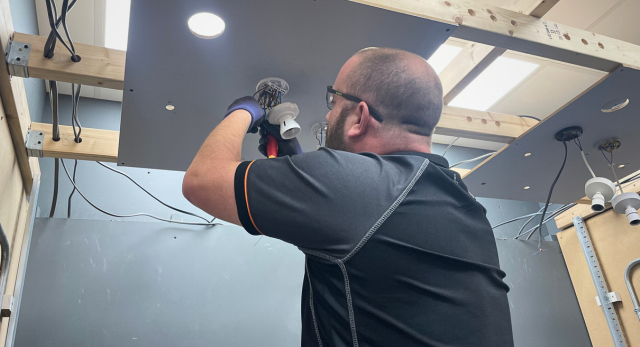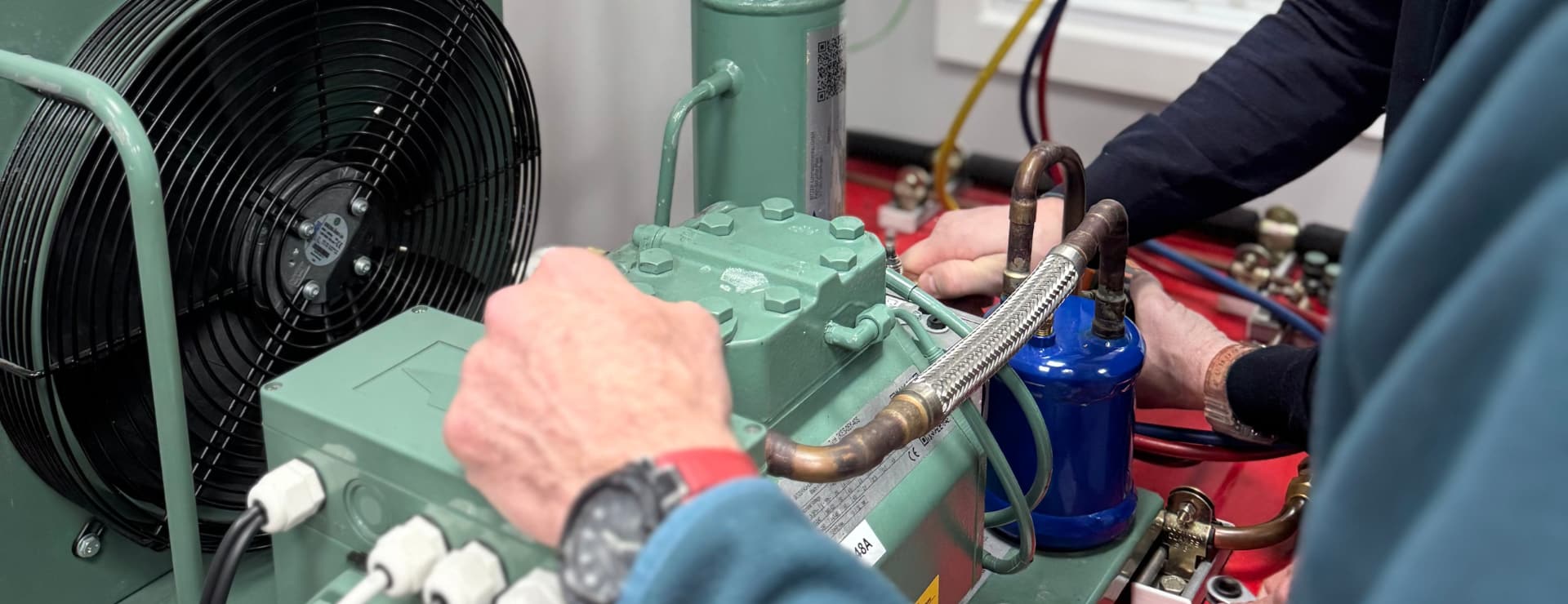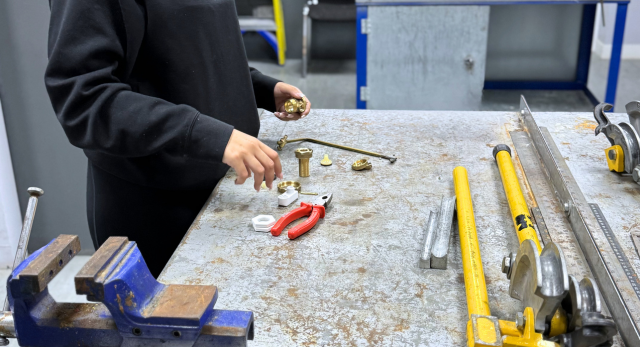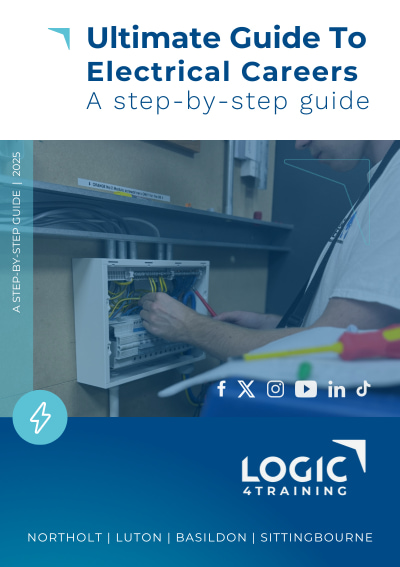Artificial intelligence is transforming global industries, sparking headlines about mass job losses and automation replacing workers. While it’s true that AI is already reshaping sectors such as administration, logistics, and manufacturing, the picture for tradespeople is very different. Skilled roles in plumbing, gas, electrics, and renewables remain some of the least exposed to automation, thanks to the hands-on expertise, problem-solving, and customer trust that AI simply can’t replicate. In fact, with the UK facing ongoing skills shortages in construction and building services, trades offer one of the most future-proof career paths available. At Logic4training, we help new entrants and experienced engineers alike adapt to emerging technologies while building secure careers that AI won’t replace.
The Truth About AI and Automation in the Workplace
So, is AI causing job losses? Yes. But the story is far more nuanced than the headlines suggest.
What the Data Really Says
Recent research from the Tony Blair Institute for Globale Change estimates that, while up to 3 million UK jobs could ultimately be displaced by AI, these losses will be gradual, peaking at between 60,000 and 275,000 jobs a year, compared to an average of 450,000 job losses per year from all causes over the last decade. The Office for National Statistics (ONS) previously estimated that about 1.5 million jobs in England were at “high risk” of automation, but these are overwhelmingly roles involving routine and repetitive tasks. Think admin, data entry, and basic customer service.
Are AI Job Losses Rising?
Globally, AI-driven job losses are rising, but the impact is highly uneven. Sectors like manufacturing, transport, logistics, and public administration are seeing the biggest changes, while health, social work, education, and skilled trades are expected to see net employment gains over the next two decades. For example, McKinsey forecasts that by 2030, 14% of employees worldwide will have changed careers due to AI, but the majority of these transitions will be into roles that require new skills, not into unemployment.
How Does AI Cause Job Losses?
AI primarily causes job losses by automating tasks that are repetitive, rule-based, or data-driven. Generative AI tools can now write reports, answer basic queries, and process invoices faster than any human. But when it comes to jobs that require hands-on skill, adaptability, and a human touch, AI is still a long way off.
The UK Government’s Vision
The UK government’s new AI Opportunities Action Plan emphasises the nation’s ambition to lead the world in responsible AI adoption, innovation, and economic growth. The plan highlights that AI is not just a challenge but a major opportunity to boost productivity, improve public services, and create new, high-quality jobs across the economy. By investing in world-class infrastructure, supporting skills development, and encouraging both public and private sector adoption, the government aims to ensure that AI benefits working people and opens up new career paths rather than simply replacing existing roles.
Crucially, the plan emphasises that while AI will transform many sectors, the focus is on harnessing its potential to complement and enhance jobs, including those in skilled trades, by freeing workers from repetitive tasks and enabling them to deliver greater value. This proactive, partnership-driven approach positions the UK to shape the AI revolution for the benefit of all, rather than being shaped by it.
Why Tradespeople’s Jobs Are Safe From AI
While AI is making waves across many industries, skilled trades stand out as some of the least vulnerable to automation. The unique demands of hands-on work, practical problem-solving, and real-time decision-making mean tradespeople possess skills that AI simply can’t replicate.
Manual Dexterity and Problem Solving
Jobs in the trades demand physical skill, on-the-spot thinking, and real-world problem-solving. You can’t fix a leaky pipe, rewire a fuse box, or service a boiler with a chatbot. Every job is different, every job is unique, and every customer has their own set of needs. This level of complexity and variability is exactly what AI struggles with.
The Human Touch
Trust matters. When you’re working in someone’s home or business, communication, empathy, and professionalism are key. Customers want to know that the person fixing their heating or installing their EV charger is reliable and understands their needs. That’s something no robot or algorithm can replicate.
Government and Industry Data
Multiple reports confirm that construction and skilled trades are among the least automatable sectors. The Tony Blair Institute’s 2024 report specifically notes that “manual jobs in construction and skilled trades are less likely to be exposed to AI-driven time savings”.
Additionally, the Department for Education’s Unit for Future Skills estimates that only 10-30% of jobs are automatable, and the vast majority of these are not in the skilled trades. Whilst now 2 years old now, and with the AI industry constantly evolving, it’s important to recognise that with the rapid pace of AI advancements, these figures may shift as new technologies emerge and automation capabilities expand, so staying informed and adaptable is essential for all workers.
Why AI Struggles with Skilled Work
AI excels at tasks that can be broken down into clear, repeatable steps. Skilled trades, by contrast, require:
- Physical dexterity and coordination:
Many tasks in the trades, such as wiring a consumer unit, soldering pipework, or installing a boiler in a tight space, demand fine motor skills, steady hands, and the ability to adapt movements in real time. Advanced robots are starting to show that they can produce some of these fine motor skills, but they lack the tactile feedback needed for this level of precision, which is why, for example, plumbing and electrical work remain firmly in human hands. - Creative, on-the-spot problem-solving:
Tradespeople often encounter unexpected challenges, like discovering hidden pipework, dealing with outdated wiring, or troubleshooting a heating system that doesn’t match the manual. These situations require thinking outside the box and drawing on years of experience—something AI simply can’t do. At Logic4training, we see daily how apprentices and experienced engineers alike must improvise solutions on site, a skill that no algorithm can match. - Adaptability to unpredictable environments:
Every job is different, and no two sites are the same. Tradespeople must quickly assess new environments, work safely in cramped lofts or busy commercial premises, and adjust their approach on the fly. Whilst advanced robotics have shown to have fine motor skills, they’re performing tasks that require these skills in favourable, lab-like, environments that are designed for their success. Currently, AI systems struggle when faced with unstructured, variable settings, which is why automation is far less effective in the trades than in controlled factory environments. - Interpersonal and customer service skills:
Building trust with clients, explaining complex issues in plain English, and providing reassurance are all core parts of a tradesperson’s job. Empathy, communication, and the ability to read a customer’s mood are uniquely human qualities. At Logic4training, we emphasise these skills in our training because they’re essential for customer satisfaction and repeat business. These are areas where AI can’t compete with humans.These are all areas where humans have a clear edge and will continue to for the foreseeable future. While AI can support tradespeople with information and routine admin, the hands-on expertise, adaptability, and people skills required in the trades ensure that skilled workers remain irreplaceable.
How AI Is Enhancing (Not Replacing) Trade Jobs
Artificial intelligence is making a real difference in the trades, not by taking jobs away, but by making skilled work more efficient, safer, and even more rewarding. At Logic4training, we’ve seen how AI is being integrated into everyday trade roles, helping professionals work smarter and deliver even better results for their customers. Here’s how AI is enhancing, not replacing, trade jobs:
- Streamlined admin and logistics: AI-powered scheduling tools can automatically organise appointments, optimise travel routes, and predict which parts or materials you’ll need for each job. This means less time spent on paperwork and more time spent on the tools.
- Smarter recruitment: AI is making it easier for employers to find the right candidates by intelligently matching skills and streamlining the assessment process. This reduces time-to-hire and helps businesses build stronger teams.
- Advanced diagnostics: Modern diagnostic tools now use AI to quickly identify faults in systems like heating, electrical, or plumbing. This leads to faster repairs, fewer callbacks, and happier customers.
- Improved safety: AI-driven wearables and site sensors monitor for hazards such as gas leaks or electrical faults, alerting workers before problems escalate. This proactive approach is making work sites safer than ever.
- On-demand support: Digital assistants like ChatGPT, Perplexity and Claude provide instant access to technical guides, installation manuals, and troubleshooting advice directly on-site, helping tradespeople solve problems in real-time.
- Continuous learning: AI-powered learning platforms can personalise training, helping tradespeople identify skill gaps and stay up to date with the latest industry standards and technologies.
What tradespeople really think about AI
If you’re wondering how other trades professionals feel about AI, you’re not alone. At Logic4training, we recently ran an AI in the Trades survey to find out how plumbers, gas engineers, electricians and other tradespeople are already using AI, what they’re worried about, and where they see the biggest opportunities.
The results paint a picture of cautious optimism rather than fear. Most respondents see AI as a way to cut down on paperwork, improve diagnostics and boost safety, while only a minority believe it will lead to fewer jobs in the skilled trades.
If you’d like to dig into the data, including how many tradespeople expect to use AI in the next five years and which tools they think will make the biggest difference, take a look at our dedicated survey write‑up here: AI in the Trades: What UK Tradespeople Really Think.
At Logic4training, we’re committed to helping you make the most of these advances. Our courses and resources, including our free AI business guide for plumbing and heating engineers, are designed to ensure you’re not just keeping up with change but you’re leading it. By embracing AI, skilled workers can focus on what they do best: solving complex problems, delivering quality work, and building strong relationships with clients. In the trades, AI is a partner, not a replacement and with the right training, the future looks brighter than ever.
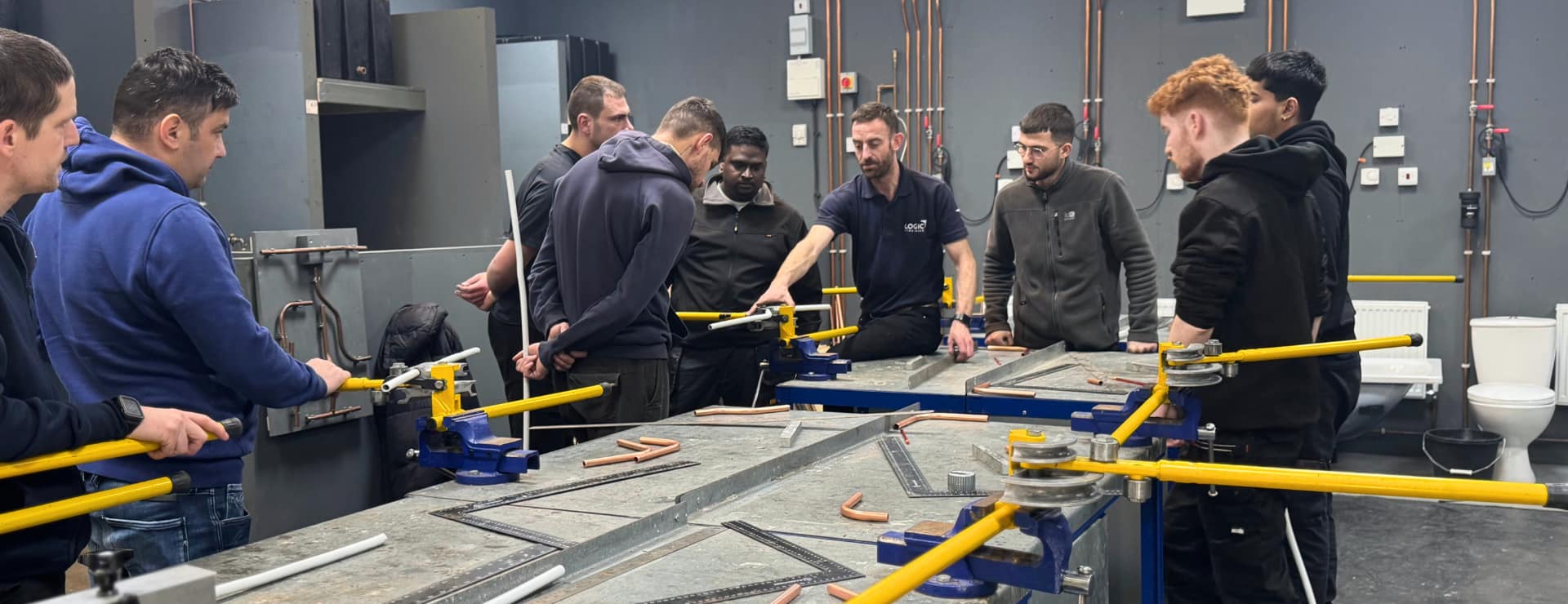
Upskilling for the AI Era
If there’s one lesson from the AI revolution, it’s this: keep learning, keep adapting.
The Value of Continuous Learning
The trades have always evolved. Think of the shift from coal to gas, the rise of renewables, or the move to smart homes. AI is just the latest chapter. Workers who embrace new technology, learn digital tools, and stay adaptable will be in the strongest position.
New Skills, New Roles
As AI takes over routine admin, skilled workers can focus on more complex, higher-value tasks, like system design, advanced diagnostics, and customer consultation. The future will see more “hybrid” roles, where technical skill is combined with digital literacy and project management.
Want to know which jobs AI will replace?
If you’re weighing up your options or thinking about a career change, it helps to understand exactly which roles are most exposed to automation and which ones are still a safe bet. Our article What Jobs Will AI Replace? breaks down the data on high‑risk office and knowledge‑based jobs, and explains why hands‑on careers like plumbing, electrics, gas and HVAC remain some of the most secure, future‑proof paths you can choose.
You’ll see how AI is already transforming interpreters, coding, customer service and other computer‑based roles, while practical trades continue to benefit from AI tools without being replaced by them. Use it alongside this guide to make confident, long‑term decisions about your next move and the skills you invest in over the coming years.
How Logic4training Can Help
We’ve been at the forefront of training for over 20 years, helping thousands of learners enter the trades and future-proof their careers. Our courses cover a wide range of sectors, including plumbing and gas engineering, electrics, refrigeration, and renewables, among others. We’re constantly updating our curriculum to reflect the latest industry trends and technologies, so you’ll always be one step ahead.
The Future Is Bright for Tradespeople
Despite all the noise about AI job losses, the demand for skilled workers in the trades is booming.
Persistent Skills Shortages
The UK’s construction and building services are grappling with one of the most severe skills shortages in recent history. A challenge that is only intensifying as demand for infrastructure, housing, and green energy projects accelerates. Currently, there are over 140,000 unfilled vacancies in construction, with forecasts indicating that more than 1 million additional workers will be needed by 2032 to meet the sector’s requirements for housing, infrastructure, and the transition to net zero. The shortage spans a wide range of roles, from gas engineers and electricians to plumbers, refrigeration specialists, and renewable energy installers.
Several factors are fuelling this crisis. An ageing workforce is a major concern, with a third of current workers set to retire by 2036 and only a small proportion of young people entering the trades to replace them. Brexit and changing immigration patterns have also contributed to the shrinking talent pool. As a result, businesses are facing project delays, rising costs, and increased competition for skilled professionals, and homeowners are experiencing longer wait times and higher prices for essential work, and ambitious government targets for housebuilding and net zero are at risk.
Despite these challenges, the skills gap presents a significant opportunity for new entrants. The sector is actively seeking to attract a more diverse workforce and is investing in apprenticeships, flexible training, and upskilling to meet demand. At Logic4training, we’re committed to supporting this transition by providing accessible, industry-leading courses and expert guidance to help people enter and thrive in the trades. For those considering a career change or looking to future-proof their skills, there has never been a better time to join the sector and help close the gap that is critical to the UK’s economic and environmental ambitions.
The Human Advantage
While AI and automation are revolutionising many industries, skilled trades remain firmly rooted in the unique strengths that only people can provide. The true value of a tradesperson lies not just in technical know-how, but in the blend of experience, judgement, and the ability to adapt to any situation; these are qualities that AI simply can’t replicate. For example, tasks like diagnosing a complex heating fault, rewiring an old property, or adapting a solution on the fly when faced with unexpected site conditions all demand hands-on dexterity and creative problem-solving that machines cannot match.
Soft skills are also becoming more valuable than ever in an AI-driven world. Empathy, communication, and the ability to build trust with clients are essential for delivering excellent service and building lasting relationships. Tradespeople often act as advisors, educators, and problem solvers for their customers. Roles that require emotional intelligence and adaptability, far beyond the reach of any algorithm. At Logic4training, we see daily how these human qualities make the difference between a good tradesperson and a great one, and why our training always emphasises both technical excellence and people skills.
Furthermore, the unpredictable nature of trade work means that every job, site, and client is different, which means that adaptability and quick thinking are crucial. While AI can assist with routine admin or offer technical data, it cannot improvise or read the room when things don’t go to plan. Ultimately, technology is a tool, but it’s the skilled tradesperson who brings judgment, reassurance, and a personal touch to every job. This human advantage ensures that, even as AI advances, the trades will continue to offer secure, rewarding, and future-proof careers for those who embrace both new technology and the irreplaceable value of human skill.
Our Final Thoughts
Will AI cause job losses? Yes, but not in the way many fear. The real risk is to routine, repetitive roles, not the hands-on, brain-engaged work that skilled tradespeople do every day. Keep learning, stay curious, and use technology to your advantage.
Despite the rapid advance of artificial intelligence, there are fundamental aspects of skilled trades that remain out of reach for even the most sophisticated AI systems. Tasks requiring manual dexterity, adaptability, creative problem-solving, and the “human touch” simply can’t be automated away. Whether you’re rewiring a house, diagnosing a heating fault, or installing a new boiler, your hands-on expertise and ability to think on your feet are irreplaceable.
AI as a Powerful Tool and Not a Threat
AI isn’t your competition. It’s your new tool to use. The smartest tradespeople are already using AI to:
- Automate admin and repetitive paperwork, freeing up more time for hands-on work.
- Optimise scheduling, stock management, and job quoting, making businesses more efficient and profitable.
- Use AI-powered diagnostics and safety tools to deliver faster, more accurate results for customers.
By embracing these technologies, you’re not just protecting your job, you’re making it better, more productive, and more rewarding. AI may be able to offer advice or process data, but it can’t crawl under a sink, troubleshoot an unpredictable issue on-site, or build trust with a homeowner. These are the moments where skilled tradespeople shine and where technology, for all its power, falls short.
The Future
The future of the trades isn’t about man versus machine. It’s about collaboration. AI and skilled workers, side by side. As AI takes on the boring, repetitive stuff, you’ll have more time to focus on what you do best: solving real-world problems, building relationships, and delivering quality work that makes a difference.
At Logic4training, we’ve been helping people build resilient, rewarding careers for over two decades. Whether you’re just starting out or looking to upskill, we’re here to help you stay ahead of the curve, AI and all.
FAQs
Are AI job losses rising in the UK?
AI-driven job losses are increasing, but mainly in sectors like administration, customer service, and entry-level office work. Skilled trades remain among the least affected due to the nature of their work.
How is AI causing job losses worldwide?
AI automates repetitive, rule-based tasks, leading to job losses in roles that don’t require manual skill or creative problem-solving. This is most pronounced in white-collar sectors, not the skilled trades.
Will AI ever replace skilled trades entirely?
It’s highly unlikely. Skilled trades require manual dexterity, adaptability, and human judgment. All areas where AI still can’t compete but never completely rule it out.
How can tradespeople protect themselves from AI job losses?
Continuous upskilling is key. Embracing new technologies, learning digital tools, and staying adaptable will keep skilled workers in demand. Training providers like Logic4training offer courses to help you stay ahead.
Is it worth starting a career in the trades, given the rise of AI?
Absolutely. Demand for skilled tradespeople is growing, and the sector is less exposed to AI-driven automation than most others. With the right training, your future is secure and full of opportunity.
